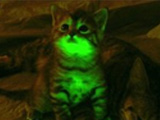|
|
TODAY.AZ / Weird / Interesting
Glowing cats shed light on Aids
13 September 2011 [15:16] - TODAY.AZ
 Cats that have been genetically modified to glow in the dark are being used to gain insights into Aids.
Cats that have been genetically modified to glow in the dark are being used to gain insights into Aids.The scientists inserted one gene into the cats that helps them resist the feline form of Aids.
They also inserted a gene that produces a fluorescent protein called GFP, Nature Methods journal reports.
This protein - which is produced naturally in jellyfish - is commonly used in this area of research to monitor the activity of altered genes.
"We did it to mark cells easily just by looking under the microscope or shining a light on the animal," said Dr Eric Poeschla, from the Mayo Clinic in Rochester, US.
The antiviral gene comes from a rhesus macaque, and produces a protein called a restriction factor that can resist Aids-causing viruses affecting other animals.
The team from the US and Japan then transferred this gene, along with the one for GFP, into feline eggs - known as oocytes.
The method worked so well that nearly all offspring from the modified eggs had the restriction factor genes. And these proteins were made throughout the cats' bodies.
The researchers found that there was reduced replication of the feline Aids virus - known as feline immunodeficiency virus (FIV) - in these cats.
Just as the human immunodeficiency virus, or HIV, does in people, FIV works by wiping out infection-fighting T-cells.
FIV infects mostly feral cats, of which there are half a billion in the world, Dr Poeschla said. It is transmitted by biting, largely by males defending their territory, but companion cats are affected as well.
In both humans and cats, proteins called restriction factors that normally fight off viral infections are defenseless against HIV and FIV because the viruses have evolved potent counter-weapons.
But certain monkey versions of these restriction factors are capable of fighting the viruses.
So far, Dr Poeschla's team has only tested cells taken from the animals and found they were resistant to FIV. But eventually they plan to expose the cats to the virus and see if they are protected.
"If you could show that you confer protection to these animals, it would give us a lot of information about protecting humans," the Mayo Clinic researcher explained.
/BBC News/
URL: http://www.today.az/news/interesting/94335.html
 Print version
Print version
Views: 1598
Connect with us. Get latest news and updates.
See Also
- 19 February 2025 [22:20]
Visa and Mastercard can return to Russia, but with restrictions - 05 February 2025 [19:41]
Japan plans to negotiate with Trump to increase LNG imports from United States - 23 January 2025 [23:20]
Dubai once again named cleanest city in the world - 06 December 2024 [22:20]
Are scented candles harmful to health? - 23 November 2024 [14:11]
Magnitude 4.5 earthquake hits Azerbaijan's Lachin - 20 November 2024 [23:30]
Launch vehicle with prototype of Starship made its sixth test flight - 27 October 2024 [09:00]
Fuel prices expected to rise in Sweden - 24 October 2024 [19:14]
Turkiye strikes terror targets in Iraq and Syria - 23 October 2024 [23:46]
Kazakhstan supplied almost entire volume of oil planned for 2024 to Germany in 9 months - 23 October 2024 [22:17]
Taiwan reported passage of Chinese Navy aircraft carrier near island
Most Popular
 What von der Leyen doesn't know about. Or doesn't want to know
What von der Leyen doesn't know about. Or doesn't want to know
 Turkish auto sector shifts gears for green transformation
Turkish auto sector shifts gears for green transformation
 Bayramov: Direct talks yield better results than mediated dialogue
Bayramov: Direct talks yield better results than mediated dialogue
 Japan grants $3 billion loan to Ukraine using profits from frozen Russian assets
Japan grants $3 billion loan to Ukraine using profits from frozen Russian assets
 Baku spends over 1 billion manats on education in Q1
Baku spends over 1 billion manats on education in Q1
 America’s tariff strategy risks fragmenting global economy
America’s tariff strategy risks fragmenting global economy
 At least 148 dead after boat accident on DR Congo river
At least 148 dead after boat accident on DR Congo river
